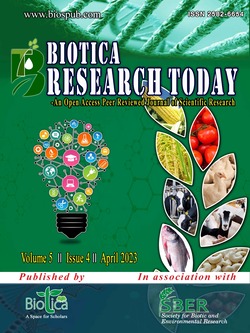
Association Mapping for Abiotic Stress Tolerance in Plants: Prospects and Limitations
Purnima Ray*
Dept. of Genetics and Plant Breeding, NMCA, NAU, Navsari, Gujarat (396 450), India
Jatin Tanwar
Division of Genetics, ICAR-Indian Agricultural Research Institute, New Delhi (110 012), India
M.R. Prajapati
Dept. of Genetics and Plant Breeding, NMCA, NAU, Navsari, Gujarat (396 450), India
Kundaria Hensi
Dept. of Genetics and Plant Breeding, NMCA, NAU, Navsari, Gujarat (396 450), India
DOI: NIL
Keywords: Abiotic stress, Genome-wide association mapping (GWAS), Linkage disequilibrium (LD), Marker-trait associations
Abstract
Abiotic stress is one of the major challenges faced by plants, which negatively affects their development, growth, and production. The use of association mapping in plants is a highly effective technique for pinpointing specific areas of the genome that are linked to increased tolerance to abiotic stress. Association mapping (AM) is a technique that utilizes thousands of genetic variations to identify the effects of quantitative trait loci (QTL) on traits. It is a powerful tool for discovering new genes and alleles, as well as for breaking down complex traits. Compared to linkage analysis, AM is advantageous because it relies on the structure of linkage disequilibrium (LD) to provide high resolution. However, several factors must be considered when using AM, including marker density, population structure, sample size, and germplasm selection. This article discusses the prospects and limitations of association mapping for abiotic stress resilience in plants.
Downloads
not found
Reference
Javid, S., Bihamta, M.R., Omidi, M., Abbasi, A.R., Alipour, H., Ingvarsson, P.K., 2022. Genome-wide association study (GWAS) and genome prediction of seedling salt tolerance in bread wheat (Triticum aestivum L.). BMC Plant Biology 22, 581. DOI: https://doi.org/10.1186/s12870-022-03936-8.
Luo, M., Zhang, Y., Li, J., Zhang, P., Chen, K., Song, W., Wang, X., Yang, J., Lu, X., Lu, B., Zhao, Y., Zhao, J., 2021. Molecular dissection of maize seedling salt tolerance using a genome-wide association analysis method. Plant Biotechnology Journal 19(10), 1937-1951. DOI: https://doi.org/10.1111/pbi.13607.
Nayyeripasand, L., Garoosi, G.A., Ahmadikhah, A., 2021. Genome-wide association study (GWAS) to identify salt-tolerance QTLs carrying novel candidate genes in rice during early vegetative stage. Rice 14, 9. DOI: https://doi.org/10.1186/s12284-020-00433-0.
Thabet, S.G., Moursi, Y.S., Sallam, A., Karam, M.A., Alqudah, A.M., 2021. Genetic associations uncover candidate SNP markers and genes associated with salt tolerance during seedling developmental phase in barley. Environmental and Experimental Botany 188, 104499. DOI: https://doi.org/10.1016/j.envexpbot.2021.104499.
Zheng, J., Zhang, Z., Gong, Z., Liang, Y., Sang, Z., Xu, Y., Li, X., Wang, J., 2021. Genome-wide association analysis of salt-tolerant traits in terrestrial cotton at seedling stage. Plants 11(1), 97. DOI: https://doi.org/10.3390/plants11010097.
